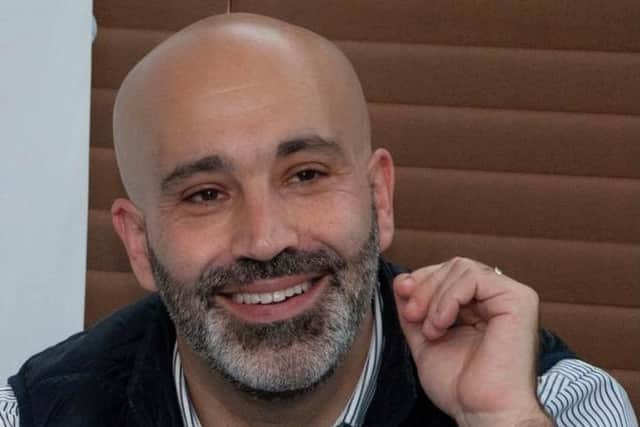In depth: how challenger bank OakNorth aims to catapult Scots growth with new on-the-ground base
The “neobank”, which launched in 2015 and serves businesses and savers, has just cut the metaphorical red ribbon at the premises in Glasgow’s George Square, looking to harness what it sees as a “huge” opportunity in Scotland, according to its head of debt finance Ben Barbanel.
Speaking to The Scotsman, he says the plan now “is very much to make Scotland a real integral part of our growth strategy – to really get to know the market [here], to get to be known in the market” – and he believes the organisation can, in the next 18 months, emulate or even exceed the almost £350 million it has already lent to businesses in the region to date.
Advertisement
Hide AdAdvertisement
Hide AdIt comes as the lender reveals that it lent more than £886m to British businesses in the first half of this year, as it seeks to support what it calls the UK’s “Missing Middle” – established small-to-medium enterprises (SMEs) who are seeking to scale, “but are routinely overlooked or underserved by incumbent banks and alternative lenders”, in what is a problem commonly cited as stifling smaller Scottish with high growth potential. To date, OakNorth has lent about £10 billion in total, and says it takes a bespoke approach.


The bank was in fact founded by entrepreneurs Rishi Khosla and Joel Perlman, and it says that when it got its banking licence, it was the third new bank in the UK to do so in more than 100 years, the second being Scotland’s Hampden & Co. OakNorth’s founding duo had found that the struggle for funding a growing business was real, having created data analytics company Copal Amba – which they eventually sold – but finding that when looking for capital, UK banks weren’t willing to lend to them.
Essential
Barbanel has said: “The UK’s Missing Middle continues to be the backbone of our economy, so powering their growth ambitions is essential for enabling the country to overcome the current economic challenges. Unfortunately, as we have seen in previous economic downturns, incumbent banks and alternative lenders tend to behave more like fair-weather friends, only supporting customers in the good times and retrenching in the bad.
"We therefore see it as an opportunity to step up to the plate and support businesses at a time when others may be unwilling or unable to. With the current cost-of-living crisis set to continue well into next year, we want to reassure businesses that we’re here to support them whether they need debt for growth, [mergers and acquisitions], a management buy-out or buy-in, working capital or anything else.”


He says the bank’s strategy when it comes to business lending is focused on “what I affectionately describe as butcher, baker, candlestick-maker”, generally lending in the £500,000 to £50m “sweet spot”, and while it has done some bigger deals, the average loan size is about £10m. As for the “Missing Middle”, he says: “We've really proven that there is a void there, there has been a void there, and there continues to be a void there.”
Barbanel adds: "Really, we want to be targeting businesses in Scotland, strong entrepreneurs, profitable businesses, strong management teams… We want to work with people that have been through cycles, that have got experience and depth in management.”
The lender has already been helping fuel growth north of the Border across a variety of sectors. Such capital provision includes providing two loans of about £36m, one to Bruntwood SciTech to acquire and redevelop Glasgow’s Met Tower (famous for its “People Make Glasgow” signage) as a hub for tech and digital businesses; and another to a fund managed by Clearbell Capital LLP for the acquisition of student accommodation sites in locations such as Aberdeen.
Funding
Also in the Granite City, it lent £18.5m to Care Concern Group to support the development of a new care home, and just over £25m to bankroll the construction of multi-purpose country park and leisure facility Lost Shore Surf Resort near Ratho alongside funding from the Scottish National Investment Bank.
Advertisement
Hide AdAdvertisement
Hide AdIt has also provided a loan to Wirefox Real Estate Group to part-fund the acquisition of The Ardgowan Hotel in St Andrews, and has a long-term working relationship with opulent hotel brand House of Gods to help it expand outside its initial Edinburgh site to Glasgow and beyond. “We want to help all entrepreneurs on their growth trajectory, and work alongside them, not just by doing one deal, but multiple deals,” Barbanel says.
The bank says it is seeing high demand for funding from Scottish firms, and in terms of the lead-up to making its local presence official, the executive explains: “Until now, we have had offices in London, Manchester, Birmingham, and Leeds. Myself and a couple of the guys in the team have been what I would describe as a little bit more than daytrippers to both Glasgow and Edinburgh over the years, on a more and more frequent basis in recent times. And we always knew that there was an opportunity to have an office and do a lot more in Scotland, it was always on the list."
He then about six months ago looked to make some on-the-ground hires in Scotland, and has now signed up Matteas Law as associate director, debt finance, and Fraser McPhail as senior director, debt finance, following roles at incumbent peers such as Santander, Royal Bank of Scotland, and Barclays Investment Bank as well as more recently business-focused Cynergy Bank that set up in Edinburgh in 2020.
McPhail says: “We'd obviously like to build a bigger team. We just see a real opportunity to grow into… the main challenger bank in Scotland… [our] ability to scale is absolutely there. We're just looking to grow – and to grow quickly.”
Comments
Want to join the conversation? Please or to comment on this article.